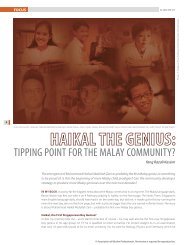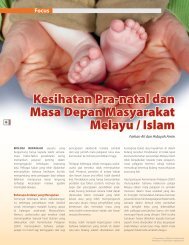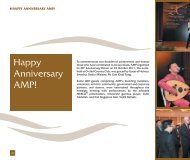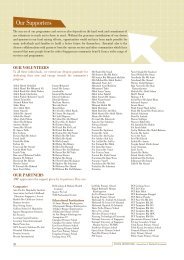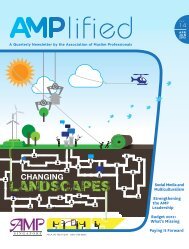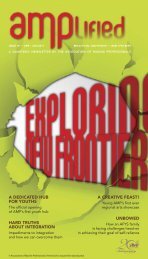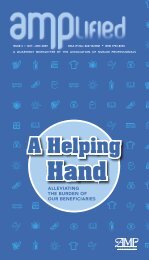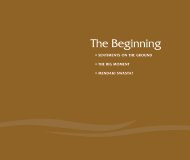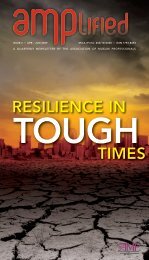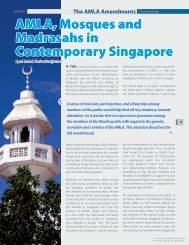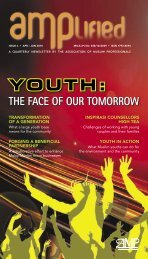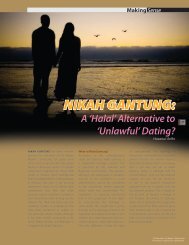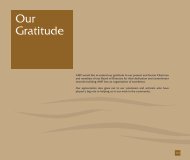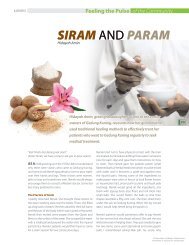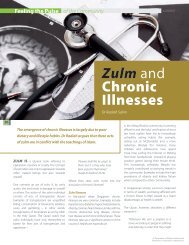The AMLA Amendments - Association of Muslim Professionals
The AMLA Amendments - Association of Muslim Professionals
The AMLA Amendments - Association of Muslim Professionals
Create successful ePaper yourself
Turn your PDF publications into a flip-book with our unique Google optimized e-Paper software.
KARYAWAN<br />
Cover Story<br />
Yet, there were some concerns heard within the<br />
community when it came to two issues – raising the<br />
community’s contribution to the Mosque and Mendaki<br />
Building Fund, and using that fund partly to finance<br />
madrasah education. Is there any basis for such concerns if,<br />
in essence, the money is to benefit the community’s own<br />
socio-religious s<strong>of</strong>tware and eco-system<br />
I would prefer to attribute these worries to ignorance, due to<br />
lack <strong>of</strong> information. In other words, they arose because the<br />
changes were not communicated to the ground extensively<br />
enough. Had there been more public consultations, and<br />
more background to the public, the changes to <strong>AMLA</strong><br />
would have been warmly embraced. In fact, had there been<br />
more open exercises, the authorities would have learned<br />
something else: how some in the community felt the need<br />
for more fundamental changes in <strong>AMLA</strong> to face emerging<br />
challenges – and not just tackling the problem <strong>of</strong> divorce,<br />
crucial as this may be.<br />
Indeed, this was also the consensus <strong>of</strong> a recent forum on the<br />
2008 <strong>AMLA</strong> changes, organised by the <strong>Association</strong> <strong>of</strong> <strong>Muslim</strong><br />
Pr<strong>of</strong>essionals (AMP) through its publication arm, Karyawan, in<br />
collaboration with Young AMP and the Centre for Research<br />
on Islamic and Malay Affairs (RIMA). <strong>The</strong> panelists comprised<br />
two senior lawyers, Arfat Selvam and Halijah Mohamad; an<br />
academic, Syed Muhd Khairudin Aljunied; a financial planner,<br />
Sadali Rasban; and the President <strong>of</strong> Young AMP, Mohd Nizam<br />
Ismail, who is also a lawyer by training.<br />
<strong>The</strong> Karyawan Forum, held just before the amendments<br />
were passed, reviewed the core issues. <strong>The</strong>re was no<br />
problem agreeing that all these changes would boost<br />
the community’s capacity in five main areas: fundraising<br />
through the Mosque Building and Mendaki Fund; religious/<br />
madrasah education; the Syariah Court; Malay/<strong>Muslim</strong><br />
families (through pre-empting premature marriages and<br />
divorce); and internationalising MUIS by ramping up its<br />
halal certification services.<br />
New Areas <strong>of</strong> Concern<br />
Notwithstanding this, the panel also felt that the<br />
amendments could have gone further, while at the same<br />
time calling for fine-tuning in some areas. Nizam Ismail,<br />
for example, felt that the Syariah Court could have been<br />
given more clout than having to resort to the Civil Court<br />
to enforce Syariah Court orders on recalcitrant husbands.<br />
<strong>The</strong> Syariah Court, he thinks, should be strengthened as<br />
an independent institution <strong>of</strong> law – just like the Civil Court<br />
– and not be a permanent sub-set <strong>of</strong> a ministry.<br />
<strong>The</strong> more significant outcome <strong>of</strong> the forum, however, is the<br />
consensus that the time may have come for the community to<br />
have a comprehensive review <strong>of</strong> <strong>AMLA</strong>. While the incremental<br />
pace <strong>of</strong> the changes to <strong>AMLA</strong> over the years is understandable<br />
to avoid any destabilising effect on society, it also risked giving<br />
the impression <strong>of</strong> a piecemeal approach to change.<br />
Indeed, the community could perhaps take a more proactive<br />
stance by positioning <strong>AMLA</strong> for the challenges<br />
<strong>of</strong> the future. After all, legislative amendments usually<br />
follow changing circumstances in society. And changing<br />
circumstances usually call for community and religious<br />
leaders to play their guiding roles.<br />
A good example <strong>of</strong> how <strong>AMLA</strong> changes follow community<br />
initiative is this latest round <strong>of</strong> amendments itself. <strong>The</strong><br />
catalyst was a group <strong>of</strong> <strong>Muslim</strong> legal pr<strong>of</strong>essionals who<br />
initiated the changes to help address the problem <strong>of</strong><br />
premature marriages and divorce within the community.<br />
Basing on their own experiences as lawyers, the <strong>Muslim</strong> Law<br />
Practice Committee <strong>of</strong> the Law Society proposed the <strong>AMLA</strong><br />
amendments. <strong>The</strong> authorities responded favourably and the<br />
amendments were passed in Parliament in November.<br />
‘A good example <strong>of</strong> how <strong>AMLA</strong> changes<br />
follow community initiative is this latest<br />
round <strong>of</strong> amendments itself. ‘<br />
<strong>The</strong> Karyawan panel proposed more such initiatives from the<br />
community in future to address whatever gaps there may be<br />
in <strong>AMLA</strong>.<br />
“<strong>AMLA</strong> has been in place for more than 40 years. And over the<br />
40 years, there has been a lot <strong>of</strong> changes in Singapore. <strong>The</strong>re<br />
has however been no comprehensive focus on the changes<br />
that have to be made to <strong>AMLA</strong> to reflect the current state <strong>of</strong><br />
the economy and the people that <strong>AMLA</strong> governs,” says Ms.<br />
Arfat Selvam.<br />
“<strong>The</strong> <strong>AMLA</strong> (changes) do not address every aspect <strong>of</strong> the<br />
life <strong>of</strong> a <strong>Muslim</strong> in Singapore. I think it is quite deliberate....<br />
<strong>The</strong>se (latest) changes however are not far-reaching and<br />
ambitious enough to address the needs <strong>of</strong> the community,”<br />
says Mr Nizam Ismail, who is also a Vice-Chairman <strong>of</strong> AMP.<br />
Islamic Estate Planning<br />
Two new areas specially identified for future attention are<br />
Islamic inheritance or estate planning and Islamic financial<br />
planning. Both have emerged as important issues given<br />
the changing nature <strong>of</strong> the Singapore economy. Yet, both<br />
can also have an impact on the institution <strong>of</strong> the family.<br />
Any ill-preparedness to address the fallouts from these new<br />
challenges could have a negative effect on the <strong>Muslim</strong> family<br />
– the building block <strong>of</strong> the community.<br />
7



